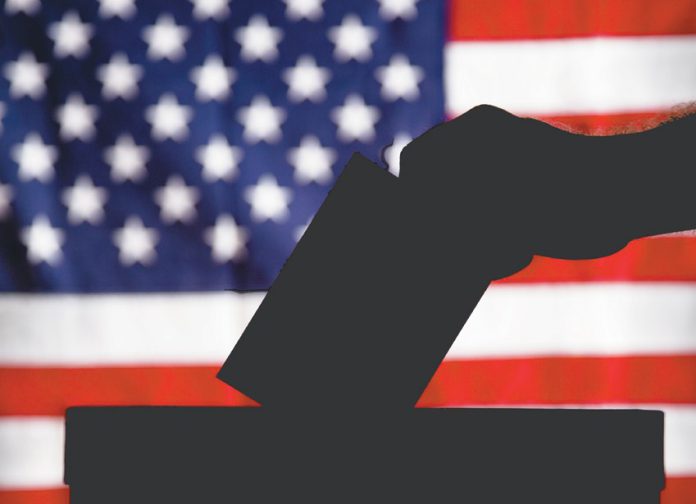A packed audience in the Gilroy Grange Hall welcomed California Assembly Speaker Robert Rivas and Santa Clara County Supervisor Sylvia Arenas, who urged voters to support two Nov. 4 ballot measures they say are necessary to counter hostile federal policies and preserve local healthcare services.
The event, organized by grassroots activism group Indivisible South County, filled the Grange Hall to capacity Oct. 4 as members of the community gathered to hear their state and regional representatives speak on Proposition 50, a statewide redistricting measure, and Measure A, a county sales tax increase to fund healthcare services.
Rivas framed Prop. 50 as a counter-offensive against what he characterized as unprecedented federal overreach by the Trump administration.

“Consider some of the Trump administration actions that they have done this year,” he said. “Unilaterally federalizing and deploying our own National Guard under the false pretense of public safety… conducting sweeping, unprecedented immigration raids on our neighborhoods that tore families apart without due process. They have blocked disaster relief from fire victims in the Palisades and Eaton, the worst natural disasters I have ever witnessed.”
In order to push back against the perceived federal hostilities, Rivas argued, Democrats need to grab every political advantage they can, even if it requires temporarily abandoning his closely held belief in the importance of independent redistricting.
“This state has been on defense long enough,” Rivas told the crowd. “You have to fight fire with fire. You have to hit back hard. And the only way you do this is by doing whatever you can legally and lawfully, changing districts, making them more competitive to give Democrats a fighting chance.”
The proposition would allow California lawmakers to temporarily replace the state’s independent redistricting process with a new district map, drawn by the Democratically-controlled state legislature, allowing the party to flip Republican-held seats in the House of Representatives to give the Democratic party an advantage on the national stage.
The temporary map would remain in use until replaced by new districts following the 2030 Census, following the normal independent process through the California Citizens Redistricting Commission.
Opponents of the measure, including Assemblymember Carl DeMaio, chairman of the Reform California campaign against Prop. 50, argue that it represents a thinly-veiled Democratic power grab and an attack on California voters’ ability to choose their representatives.
“Prop 50 takes the redistricting power away from citizens and gives that power back to the politicians so they can manipulate the lines of election districts for their own personal political benefit,” DeMaio said in campaign materials.
Rivas defended the proposed legislation, citing similar partisan redistricting in Texas and Missouri by Republican-led state legislatures as requiring a like response from Democrats in order to maintain balance.
“Trump knows that we are very vulnerable,” he said. “His policies have been a disaster for this country and certainly for our state, and the Republicans are going to lose the House. They’re trying to rig the rules so that they can hold onto power to maintain control with this very razor-thin Republican majority.”
Measure A seeks to offset federal cuts
Arenas shifted the focus to local concerns, advocating for Measure A, a five-eighths cent sales tax increase that would generate approximately $330 million annually for up to five years to support Santa Clara County’s healthcare system in the wake of the Trump administration’s deep cuts to Medicaid, the main source of funding for Santa Clara County healthcare services.
“This is a billion-dollar cut to our county services,” Arenas said, describing the impact of federal funding reductions. “When we have a cut, we do everything that you do, everything our households do—we cut additional things. But for a system like ours, we don’t have luxury items because our system is about lives, it’s about supporting our families.”
Opponents of the measure, including Silicon Valley Taxpayers’ Association Executive Director Elizabeth Brierly, argue the sales tax increase would discourage consumers from shopping locally and instead drive buyers to neighboring counties or to make purchases online, resulting in damage to the local economy and the closure of local businesses.
“If a larger percent of local businesses and household budgets is taken for taxes, fewer purchases will be made, especially by those who are unemployed, retired or on fixed incomes, because they just don’t have more to spend,” Brierly said during a recent debate. “At a time when the laws of economics suggest that reducing sales taxes would stimulate sales, we’re being asked to consider discouraging sales by raising the cost of everything we buy locally.”
Arenas emphasized the regional importance of the county’s healthcare facilities, noting that Valley Medical operates the only burn center between the Bay Area and Oregon, illustrating that there is only so much that the county can cut before essential, life-saving services are on the chopping block.
“This is not going to cover the billion-dollar hole that is left in our system,” Arenas said of the proposed new tax. “We’re going to ask our community to do their part in order to create some revenue … but for the time being, we’re also making a tremendous amount of cuts. We’ve already, in the past two years, eliminated 800 positions, knowing that times were going to be tough, and we’re not done yet.”
The Santa Clara County measure also includes a citizens’ oversight commission for transparency and accountability. Sales tax increases would not apply to groceries, prescriptions and other essential items, Arenas noted.
Rivas urged attendees to hand-deliver ballots to election offices rather than mailing them, citing distrust of the Trump-controlled postal service with handling California ballots.
“Don’t mail in your ballots,” he said. “Hand-deliver your ballots to the elections office because we don’t trust the federal postal service at the moment to deliver your ballots.”















